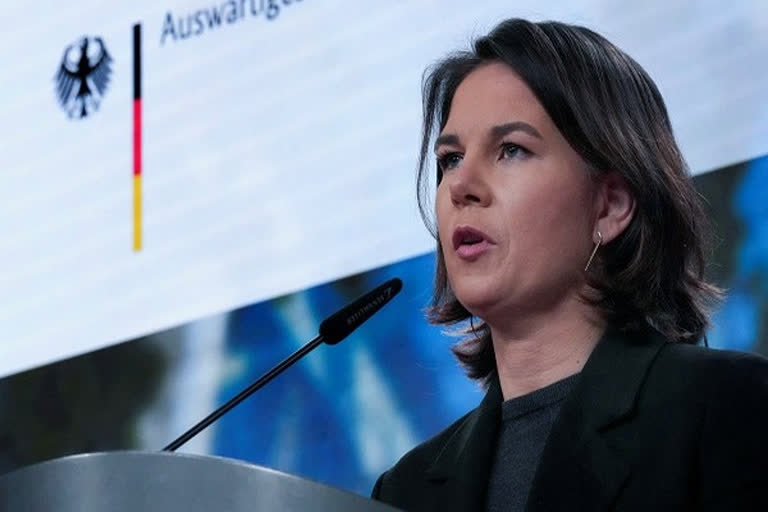New Delhi:New Delhi: There is no doubt that India will have a decisive influence on shaping the international order in the 21st century – in the Indo-Pacific and beyond, said German Foreign Annalena Baerbock during her departure from India.
"Visiting India is like visiting a sixth of the world. As early as next year, India will overtake China as the most populous country in the world. There is no doubt that India will have a decisive influence on shaping the international order in the 21st century – in the Indo-Pacific and beyond," the German Foreign Minister said.
She said that India has managed to lift more than 400 million people – almost as many as people in the EU – out of absolute poverty in the last 15 years, which is impressive. It shows that social plurality, freedom, and democracy are a motor for economic development, peace, and stability. Working on this together with strengthening human rights is also our task.
In the final month of Germany's G7 presidency, Baerbock is visiting India just days after it took over the G20 presidency. She said that at the G20 summit in Bali, India showed that it is ready to play its role globally while adding that the clearer positioning of the G20 against the Russian war of aggression in Ukraine is ultimately also due to India.
" As an emerging economic power and a solid democracy, India is both a role model and a bridge for many countries in the world, despite all the internal social challenges. And a natural partner of Germany," Baerbock reiterated.
Baerbock pointed out that the Indian government has set itself ambitious goals not only in the G20 but also at home for its people. When it comes to expanding renewable energies, India wants to push ahead with the energy transition more than before,she added.
"Germany stands by India's side. Because the dramatic effects of the climate crisis affect us all, destroying livelihoods in Europe as well as in India. That we want to strengthen our economic, climate, and security policy cooperation with India beyond our strategic partnership, is no empty words. I will also sign a mobility agreement in New Delhi that will make it easier for our people to study, do research, and work in each other’s country", she said.
Meanwhile, Lisa Badum,Germany's head of the Subcommittee on International Climate and Energy Policy said "India and Germany are robust and powerful countries. But our fight against the climate crisis will not be successful if every country fights on its own. We need strong partnerships."
Also Read: EAM Jaishankar holds talks with German foreign minister Baerbock
Badum also said that since the establishment of diplomatic relations more than 70 years ago, both countries have formed ties on multiple levels. "We especially want to highlight the bilateral partnership for green and sustainable development and use the momentum of Cop27 to stress the importance of international climate cooperation and to mobilize all efforts to reach the 1,5-degree-goal", Badum added.
She reiterated that Germany wants to emphasize its solid support for India’s goal - as formulated by Prime Minister Narenda Modi- to use its prestigious G20 presidency in 2023 to promote hope, peace, and democracy, to strengthen the support for the most vulnerable people and nations on earth, and to intensify the fight against climate change.
Badum also hoped for a fruitful exchange that underlines the importance of the partnership and Germany's aims to promote new partnerships like the one between the G7 and India for an energy transition that aims to phase out coal and boosts sustainable growth and social justice for all.
The Subcommittee on International Climate and Energy Policy was founded in April 2022 by the Foreign Committee of the German Bundestag, highlighting the importance of a coherent German Climate Foreign Policy.
Later in the day, India and Germany signed an Agreement on a Comprehensive Migration and Mobility Partnership implementing the statement of Intent on the key elements of the migration and mobility partnership exchanged between the two countries in 2019.
External Affairs Minister, Dr. S. Jaishankar and the German FM, Annalena Baerbock signed the Agreements on behalf of the Government of India and the Government of Germany respectively.
The agreement is part of overall efforts to create a network of agreements with prospective labor market destination Countries with twin objectives of creating a favorable visa regime for Indians towards accessing the labor market of these countries.
It has specific provisions to facilitate mobility and employment opportunities for fostering the exchange of skills and talents.
During the day External affairs Minister Dr S Jaishankar said that India’s trade with Russia is at a very small level in comparison to European nations. Addressing a joint press conference with his German counterpart, Jaishankar said "India’s trade with Russia is at a very small level- 12-13 billion dollars,in comparison to European nations".
"We have also given Russians a set of products... I don't think people should read more into it other than the legitimate expectations of any trading country to increase its trade", he said.
Jaishankar underlined that European Unions from February to November have imported more fossil fuel from Russia than the next 10 countries combined. "The oil import in European Union is six times what India has imported; gas is infinite times because we don't import it", added the External Affairs Minister.
Jaishankar further stated that he is involved in the ongoing discussions taking place with Russia. “I currently in fact head a body with a Russian deputy Prime Minister as a counterpart which is dedicated to actually expanding our economic cooperation," he added.



